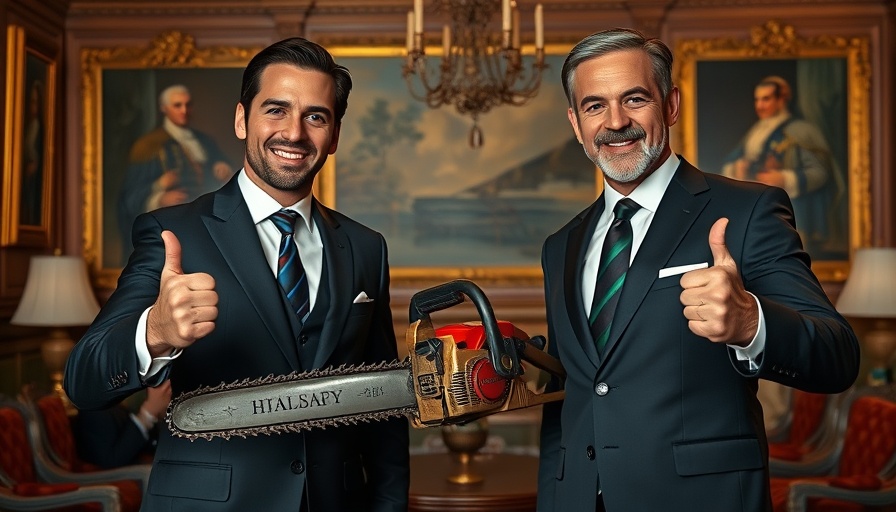
Robert F. Kennedy Jr. and Javier Milei: A Meeting of Controversy
In a bizarre and unexpected political moment, Robert F. Kennedy Jr. recently posed for a series of curious photographs with Argentina's President Javier Milei. Their meeting, held at the Casa Rosada in Buenos Aires, was reportedly focused on creating an alternative international health organization to compete with the World Health Organization (WHO). While the political implications are significant, the images of Kennedy wielding a chainsaw have rapidly gone viral, overshadowing the actual discussions at hand.
A Chainsaw for Political Statements
The chainsaw, which has become something of a trademark for Javier Milei, symbolizes his radical approach to governance—promising austerity and a dramatic overhaul of Argentina's financial systems. This theatrical gesture, showcasing power and defiance, has been likened to trends where political figures adopt unusual props to convey their messages. During the Conservative Political Action Conference (CPAC) earlier in 2025, billionaire Elon Musk also brandished a chainsaw, further entrenching this image in the political narrative of the far-right.
Understanding the Backdrop: WHO and Alternative Health Initiatives
The backdrop to this meeting is steeped in Trump's controversial withdraw from the WHO on his return to office, a directive echoed by Milei shortly after his inauguration. The skepticism towards WHO, particularly from far-right factions, centers on claims of authoritarianism and inefficiency. Kennedy's statements of wanting a health system based on "gold-standard science" free from political control reflect a growing movement among certain political groups to challenge established global health norms.
Historical Perspectives: Politics and Propaganda
The use of props in political discourse has historical precedence, often serving to simplify complex ideologies into digestible public imagery. For instance, figures throughout history have used items like shovels, axes, and even chainsaws to symbolize their allegiance to certain political movements. As seen in this recent occurrence, the symbolism retains its power, drawing public attention even as core issues might become obscured by such dramatic displays.
The Audacity of the Photos: Social Media’s Role in Politics
Going viral for events like this showcases the duality of modern political communication, where social media can simultaneously amplify and trivialize significant political stances. Rather than focusing strictly on the controversial dialogue about health systems, social media has propelled the peculiar imagery of Kennedy and the chainsaw to the forefront. This has sparked discussions not only about the participants’ projects but also about the effectiveness of visual storytelling in politics. Is the act of posing with a chainsaw truly reflective of one’s policies, or is it merely a crass stunt aimed at garnering attention?
Future Implications: Will Alternative Health Frameworks Gain Traction?
The implications of creating an alternative health organization are vast. As nations consider distancing themselves from established bodies like WHO, it is imperative to explore potential frameworks that can operate effectively in global health. While challenges will arise, such as establishing credibility and effective governance, these movements might signal a shift towards localized, ideologically driven health governance. Should more countries follow suit, the landscape of international health policies could drastically transform.
Contrasting Perspectives: The Benefits and Dangers of a New Paradigm
Supporters of the proposed alternative organization argue that it could lead to tailored health solutions reflecting national interests. Critics, however, warn that fracturing global health entities could create chaos, particularly in managing transnational health crises like pandemics. Thus, while Kennedy and Milei’s initiative might appear appealing to some, the broader consequences call for extensive discourse regarding the efficacy of such an approach.
Call to Action: Staying Informed is Key
As political landscapes evolve alongside health dialogue, it becomes increasingly vital for citizens to engage critically with these developments. Understanding how political theatrics shape public perception allows voters to navigate the complexities of current political discussions effectively. Stay informed not only about the rhetoric but also about the policies that impact your health and well-being.
 Add Row
Add Row  Add
Add 




 Add Row
Add Row  Add
Add 

Write A Comment